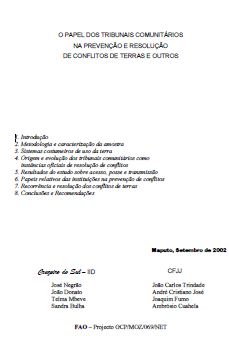Location
The Regional Office for Africa advocates for strong regional partnerships and timely Country Office support.
The substantive technical work of the Regional Office focuses on co-ordinating normative work and its policy dimensions and leadership of the regional dimension of the Organization’s technical networks.
Three main areas characterize the African regional dimension: priority setting and strategic planning, partnership development, and resource mobilization.
The major actions of the Office in Africa put a particular emphasis on:
- Country Offices are the key to FAO's success
- Stronger, more demand-driven multi-disciplinary technical teams
- Intensified regional administrative and operational support and Country Office oversight
- Full capitalization of the potential for extra-budgetary funding
- Focused policy dialogue
- Strengthened support to Pan-African institutions
The Office works at greater focus on high level dialogue and policy formulation in partnership with regional organizations, as well as greater support to the other decentralized offices through closer oversight and support. With its skill-mix technical teams, it makes a point in focusing on country level activities by the multi-disciplinary teams as well as stronger, specific partnerships with the Regional Economic Communities.
Members:
Resources
Displaying 101 - 105 of 107Développement rural durable et sécurité alimentaire: Rôle de la Mise en valeur des montagnes en Afrique
Meeting Name: Regional Conference for Africa (ARC) (22nd Session)
Meeting symbol/code: ARC 02 INF/7
Développement rural durable et sécurité alimentaire: Rôle de la Mise en valeur des montagnes en Afrique
Meeting Name: Regional Conference for Africa (ARC) (22nd Session)
Meeting symbol/code: ARC 02 INF/7
EL APOYO DE LA FAO A LA “NUEVA ASOCIACIÓN PARA EL DESARROLLO DE ÁFRICA”: CUESTIONES DE RECURSOS DE TIERRAS Y AGUAS Y DESARROLLO AGRÍCOLA
Meeting symbol/code: ARC 02 4
O papel dos tribunais comunitários na prevenção e resolução de conflitos de terras e outros
O presente relatório inscreve-se nas actividades desenvolvidas no âmbito do Projecto GCP/MOZ/069/NET, estabelecido entre a Organização das Nações Unidas para a Agricultura e a Alimentação (FAO) e o Governo da República de Moçambique, cujo objectivo geral é o de apoiar a implementação de três diplomas legais recentes e inovadores no ordenamento jurídico moçambicano: a Lei de Terras, a Lei do Ambiente e a Lei das Florestas e Fauna Bravia.
Este objectivo geral desdobra-se em quatro objectivos específicos, assim escalonados:


